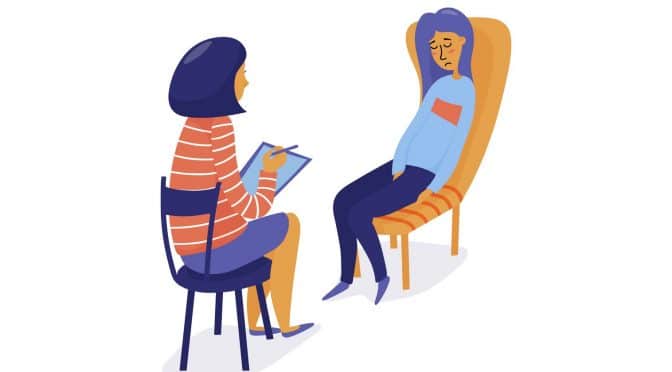Why the Best Psychologist in Delhi Can Change Your Mental Health
Why the Best Psychologist in Delhi Can Change Your Mental Health
Blog Article
The Duty of Psych Therapy in Handling Anxiousness and Depression
Psychiatric therapy has arised as a cornerstone in the monitoring of stress and anxiety and anxiety, supplying customized treatments that range from Cognitive-Behavioral Therapy (CBT) to mindfulness-based techniques. These techniques not just help people in recognizing and reorganizing negative thought patterns however additionally foster present-moment recognition, reducing the propensity to ruminate. As we discover the different measurements of psychotherapy, it becomes evident that these approaches do even more than merely relieve signs; they dramatically enhance emotional regulation and interpersonal abilities - Best Psychologist in Delhi. What remains to be taken a look at is just how these healing approaches can be efficiently customized to fulfill private needs, thus optimizing their effect.
Understanding Stress And Anxiety and Depression
Recognizing stress and anxiety and depression calls for an extensive take a look at these widespread mental health conditions, which commonly exist side-by-side and dramatically influence an individual's everyday life. Anxiousness is identified by relentless, extreme concern and fear concerning everyday circumstances. Symptoms consist of uneasyness, quick heart rate, and difficulty concentrating. On the other hand, depression shows up as a prevalent feeling of sadness, sadness, or vacuum, usually gone along with by a loss of rate of interest in formerly enjoyed activities, adjustments in hunger, and sleep disruptions.
The conjunction of anxiousness and clinical depression can intensify signs and symptoms and make complex diagnosis and treatment. People struggling with both conditions may experience more severe symptoms, higher disability in occupational and social performance, and a much longer duration of ailment. This comorbidity necessitates a nuanced understanding and strategy to treatment.
Neurobiological factors such as neurotransmitter inequalities, hereditary predispositions, and environmental stressors contribute to the advancement and upkeep of these disorders. Cognitive patterns like adverse reasoning and maladaptive actions can bolster these conditions. Understanding the complex interaction of these aspects is critical for reliable treatment. Comprehensive analysis by psychological health professionals is important to recognize the presence and level of these problems, leading the way for customized restorative approaches.
Types of Psychotherapy
Psychiatric therapy, likewise known as talk treatment, includes a range of therapy techniques made to reduce symptoms of stress and anxiety and clinical depression by dealing with the underlying emotional and mental problems. Different sorts of psychotherapy are customized to fulfill the unique requirements of individuals, offering a series of approaches to psychological healthcare.
One widely utilized kind is psychodynamic therapy, which focuses on understanding and fixing subconscious problems coming from very early life experiences. By exploring these ingrained concerns, individuals gain understanding into their existing habits and emotion.
Interpersonal Treatment (IPT) is another effective technique that concentrates on boosting social connections and function to reduce depressive symptoms. It generally attends to issues such as sorrow, duty transitions, and social disputes.
Humanistic therapies, such as Client-Centered Therapy, highlight individual growth and self-actualization. Best Psychologist in Delhi. These approaches produce an encouraging setting where people can explore their sensations and create a stronger sense of self
Lastly, Dialectical Behavior Modification (DBT) incorporates cognitive-behavioral strategies with mindfulness methods. Originally established for borderline personality problem, DBT has been adjusted to treat anxiety and anxiety by training skills in distress resistance, emotional regulation, and interpersonal efficiency.
These varied psychotherapeutic approaches supply several paths to psychological wellness and wellness, dealing with healing needs and specific choices.
Cognitive-Behavioral Therapy (CBT)
Among the various psychotherapeutic techniques, Cognitive-Behavioral Treatment (CBT) stands out for its structured, ambitious strategy in treating stress and anxiety and anxiety. Created by Aaron T. Beck in the 1960s, CBT is predicated on the concept that maladaptive thinking patterns add dramatically to psychological distress and behavioral concerns. By recognizing and reorganizing these unfavorable thought patterns, CBT intends to minimize signs and foster healthier cognitive procedures.
The therapy encompasses a variety of strategies, including cognitive restructuring, exposure treatment, and behavior activation. Cognitive restructuring focuses on challenging and changing altered cognitions, while exposure therapy progressively adapts clients to anxiety-provoking stimuli, reducing evasion behaviors.
Empirical evidence emphasizes the effectiveness of CBT, with countless researches demonstrating its performance in minimizing symptoms of anxiousness and anxiety. This healing technique has actually been adapted for numerous populations and setups, verifying flexible and adaptable. Its structured nature, empirical support, and concentrate on skill purchase make CBT a keystone in the psychotherapeutic treatment of anxiety and depression.
Mindfulness-Based Methods
Mindfulness-Based Techniques have actually gathered significant focus over the last few years as effective interventions for anxiety and depression. Rooted in old reflection practices, these methods aim to cultivate an enhanced awareness of the present moment, which can assist individuals disengage from the ruminative idea patterns typically connected with anxiousness and depressive problems.

Likewise, Mindfulness-Based Cognitive Treatment (MBCT) incorporates principles from Cognitive-Behavioral Therapy (CBT) with mindfulness methods. MBCT is particularly efficient in stopping regression in people with persistent clinical depression. By recognizing early indication of depressive episodes, individuals educated in MBCT can apply mindfulness techniques to alleviate the onset of full-blown episodes.
Advantages of Psychiatric Therapy
Countless studies have shown the profound advantages of psychiatric therapy for individuals facing anxiety and clinical depression. Among the vital benefits is the renovation of emotional law. Psychiatric therapy outfits people with dealing strategies to manage stressful feelings, consequently decreasing signs of anxiousness and depression. Cognitive-behavioral therapy (CBT), as an example, helps people identify and challenge unfavorable idea patterns, cultivating an extra favorable and balanced outlook.
Additionally, psychiatric therapy gives a structured atmosphere for self-exploration and understanding. By discussing their great post to read experiences and feelings with an experienced specialist, individuals can uncover underlying issues adding to their mental health pop over here struggles. This self-awareness is a crucial step towards lasting recuperation and strength.
Another considerable advantage is the improvement of interpersonal abilities. Anxiousness and depression usually stress connections, resulting in isolation. Via therapeutic treatments, individuals find out efficient communication and conflict-resolution skills, which can enhance their interactions and foster supportive connections.
In addition, psychiatric therapy supplies a tailored technique to treatment. Ultimately, the benefits of psychotherapy prolong past sign alleviation, adding to overall wellness and quality of life.

Final Thought
Psychotherapy dramatically contributes to the management of anxiousness and anxiety by offering efficient coping approaches and a secure setting his comment is here for self-exploration. Methods such as Cognitive-Behavioral Treatment (CBT) and mindfulness-based techniques contribute in determining and restructuring unfavorable idea patterns, while promoting present-moment recognition. These customized interventions not only reduce signs and symptoms yet likewise improve emotional law and social skills, therefore boosting overall health and high quality of life for people dealing with these psychological health and wellness difficulties.
Psychiatric therapy has arised as a cornerstone in the management of anxiousness and clinical depression, supplying customized treatments that vary from Cognitive-Behavioral Treatment (CBT) to mindfulness-based methods.Comprehending stress and anxiety and anxiety needs a comprehensive look at these common psychological health problems, which often coexist and substantially effect a person's everyday life.Among the numerous psychotherapeutic methods, Cognitive-Behavioral Treatment (CBT) stands out for its structured, goal-oriented method in dealing with stress and anxiety and anxiety.Many research studies have shown the extensive benefits of psychiatric therapy for people grappling with anxiousness and clinical depression. Psychotherapy outfits clients with coping strategies to manage stressful feelings, thereby minimizing signs of anxiousness and clinical depression.
Report this page